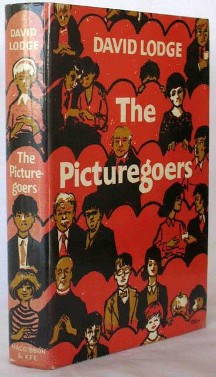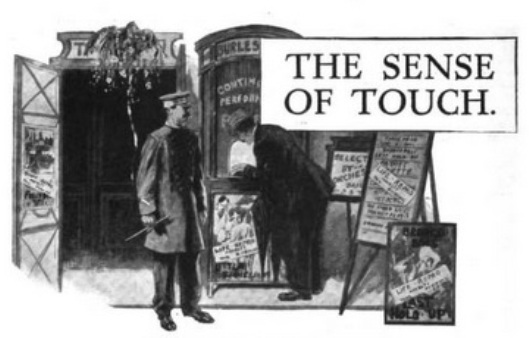Source: Mo Heard, interviewed in Margaret O’Brien and Allen Eyles (eds.), Enter the Dream-House: Memories of Cinemas in South London from the Twenties to the Sixties (London: Museum of the Moving Image, 1993), pp. 63-66
Text: We lived in Catford, the edge of Catford, in Lewisham in South-East London. My Mum went to Taunton to have me because it was during the Blitz in 1940. I’m the only child. I have no brothers or sisters and my dad was away in the army. My mother went to the pictures twice a week and I’m sure she took me. My earliest memories are going to all the cinemas in that area: there were three in Catford and there were three in Lewisham and I went to all of them. My mother took me to “A” films – Joan Crawford and Bette Davis and all those. I think my earliest memories are round about 1945, 1946. I remember seeing It Always Rains on Sunday and all those British films. We used to go after nursery school. What I do remember is my mother used to buy the ice-cream in the Co-op, so it must have been at a period when you couldn’t get ice-creams in the cinemas or they were cheaper outside, and we used to take those with us.
About ice-creams in cinemas, we used to get tubs and they were very, very hard and you used to peel round the top of the cardboard tubs until it was halfway down and the ice-cream inside was so hard you could hold the tub and lick it like an ice-cream cone. And I always remember the tops – you never had wooden spoons in those days, you took the top off and folded it in half and used that as a spoon.
I remember coming out and it was dark and we used to walk home and always stop at the fish and chip shop and but threepenneth of chips. I was completely hooked by all those films.
Did any films frighten you as a child?
I remember very vividly certain frightening scenes but I do not remember what films they were from. They must have been “A” films but obviously, because I was so young, I would not know what the title was. I remember there was a woman in a bedroom and she heard the glass breaking downstairs and she went down the staircase and her silhouette was against the wall and she had a flowing nightgown on. I don’t know who it was. And she came down the stairs and I think whoever it was at the bottom reached up and murdered her or something. And there was another film where some woman was walking down a crunchy gravel path in a park or a garden at night and there were footsteps following her in this crunchy gravel. And then she stopped and they stopped.
In those days it was continuous performance, so you’d go in and move along the row and then you’d plonk down and you might be in the middle of a B picture. How at the age of four or five could you pick up a story like that? And then you’d go through the newsreels and the ads and the rest of it and then you’d get the A picture and then you’d come to the B picture. And the moment it got to the point where we came in, my mother would nudge me and say “This is where we came in.” And up you’d get and walk out. We didn’t have to leave but I suppose she didn’t want to sit there any longer.
Did you go to children’s shows on Saturday mornings?
I went to Saturday morning pictures at the Prince of Wales [Lewisham] and the Plaza [Catford]. I became an ABC Minor – “We’re Minors of the ABC and every Saturday we go there … and shout aloud with glee”, etc., etc. I remember when the manager – or whoever used to get up before the films on stage and get us to sing bouncing ball songs – asked if there were children who wanted to get up and do tap dances and things, I got up with a friend and we sang “I’m Forever Blowing Bubbles”. I think I must have been only about seven. It must have been painful.
And, of course, the terrible noise that all the yobby kids made! And my friend and I used to sit near the back and we were terribly classy because we knew about cinema and we watched the films. Every time in the films they came to the dialogue, suddenly mayhem, pandemonium broke out, and we would sit there and we’d go “Shut up! Be quiet!” and tell off these kids around us. Once we obviously chose the wrong people to tell off, because they chased us afterwards down the High Street and were going to beat us up.
When I was older I would say I was brought up on the American musical and I just dreamt and fantasised about being Vera-Ellen and Cyd Charisse, Debbie Reynolds, Mitzi Gaynor – all those actresses with their very tight waists and their big belts and their dresses and skirts that went out and there were all those petticoats. When someone like Mitzi Gaynor did a twirl and the skirts sort of rose up, they had about six miles of thick petticoats on underneath.
Did you ever try and copy hairstyles and make-up?
I don’t think so. I used to draw ladies with dresses like that on my school books and all over the place. I do remember in Catford there was a shoe shop on the corner of Wildfell Road and Rushey Green and it was called Vyners of Hollywood. And in the windows, literally stacked from floor to ceiling, were thousands of shoes, and they were all glamour shoes. And they had sort of twelve-inch wedge heels and they were made of snake skin. And they had peep toes and high ankle things. And I used to drool over that shop. I never ever met anyone in the street who ever wore anything like that. And I really wanted shoes like that. By the time I got to the age of being able to wear shoes like that, they’d disappeared.
I used to go to matinees in the holidays with friends. And I remember my friend and I, we must have been about ten, queuing up for hours to see this wonderful film at the Queens in Rushey Green. It was next to the Lewisham Hippodrome. It was the most beautiful cinema. It was very tiny. There were a few marble steps up to these gold-handled glass doors and then there was a central paybox. I think you went in either side. I remember low ceilings, very narrow inside, and lots of brass. There was a brass rail halfway down with a red plush curtain and presumably the expensive seats were behind and the cheaper ones in front. On the left-hand side, there were only three or four seats against the wall before the aisle, just a few seats down the side. I can see it now: it was quite narrow but tall and arched, so it was definitely a mini electric palace.
And I remember queuing for hours to see this film with my friend and when we finally got in and were sitting there watching this film, the usherette came up with a torch and shone it one me. And there was my dad who was terribly cross because he’d obviously got very worried that I hadn’t come home. He knew that I’d gone to the pictures and he’d come to find me and fetch me out.
Talk about being shown up in the cinema, I remember going to the Gaumont at Lewisham with my mum and my aunt and it was in the afternoon and just a few people in there, and they’d bought the cheaper seats at the front. And I remember my aunt, who was always a bit of a girl, she said, “Come on, there are loads of seats – let’s move back.” And we moved back and, of course, the usherette came and told us off and made us move forward again. There was no one sitting at the front at all and I was very embarrassed by that.
What was the Gaumont like as a building?
The Gaumont at Lewisham was a palace. We never, ever went in the circle at the Gaumont. It was obviously far too expensive for my mum. We always went in the stalls. And what I do remember is queuing to get into a film that everybody wanted to go and see. And once you’d bought your ticket, on each side of the foyer they had these “corrals” and you would go into this corral which had a brass rail and you would queue inside that. And then they would let you into the back of the stalls where they had more corrals, which I’ve never seen anywhere else. The cinema was enormous – I think it must have had about six aisles. Right at the back, you had the low wall on the back seats and then you had this step up away from the back aisle and that had the brass rails round it. So you were let into one of these corrals where you stood and you were higher than the seats so you could watch the film. And then they would gradually get you out and seat you.
And one other thing: some B picture star, Faith Domergue, had appeared at the Gaumont and there she was coming down the stairs and my mother said, “Go on, go and ask her for an autograph.” And she got my diary out and I went up and this film star used my back to write her autograph, and there was a flash, a photographer, and my mother discovered it was the local paper. And she said, “You’re going to be in the local paper.” But I never was.
Comments: Mo Heard has been an actress, publisher, writer, usherette at the National Film Theatre, and at the time of this interview in 1993 she was manager of the Actors’ Company at the Museum of the Moving Image in London. The Queen’s Hall at Rushey Green opened in 1913 and closed in 1959. The Gaumont Palace in Lewisham opened in 1932 and seated 3,050. It finally closed as a cinema in 1981. My grateful thanks to Mo Heard for permission to reproduce this interview.


